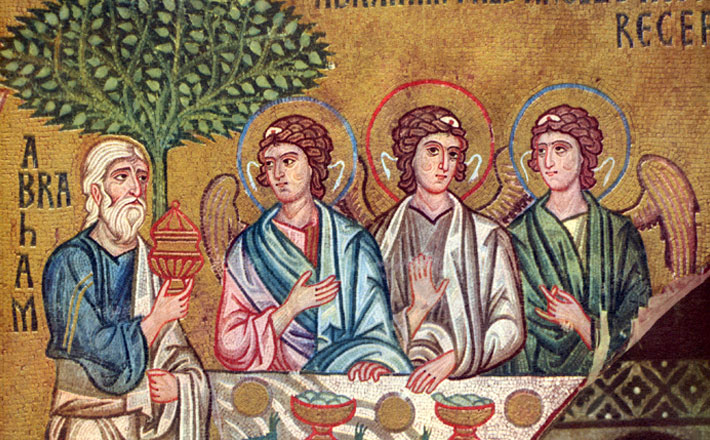Commentary on Genesis 18:1-10a
Genesis 18 occupies the place of the First Lesson for the next two weeks.
This week we find Abraham and Sarah encountered by the three mysterious travelers under the trees at Mamre. Next week, we listen-in to Abraham’s appeal for the sparing of wicked Sodom. Preachers and their hearers would benefit from spending these two weeks dwelling in this narrative, which is abundant with fodder for the imagination of faith.
Particular to this week’s pericope boundaries, the reading ought to be extended through Genesis 18:15.
Textual horizons
“The Lord appeared to Abraham by the oaks of Mamre … ” (Genesis 18:1, NRSV)
At least two things are critical here in this first bit of the pericope — a bit that functions like a section heading. The encounter under the terebinths of Mamre is between Yhwh and Abraham. While there is great debate and significant mystery about how to understand Abraham’s three visitors, the text frames the encounter as an encounter with Yhwh.
A second important bit of this is the location of this encounter. Abraham is reclining beneath the terebinths of Mamre.1 Recall for a moment the significance of this place, which among other things was place where Abram built an altar to the Lord after the covenant was renewed.2 There is a tradition, cited by Josephus, that the terebinth at Mamre is as old as the world itself, and another tradition that this place, where Abraham was circumcised, is the spot upon which the altar in the Temple of the Lord would eventually stand.3 What unfolds under and around the terebinths of Mamre unfolds in a holy place.
Abraham, this ninety-nine-year-old fellow, who (together, of course, with Ishmael and all the men with him) has just had his foreskin lopped-off, is in a posture of repose under the terebinth. (A seemingly reasonable assumption of the newly circumcised.)4 It is a time of recovery and healing, as the covenant with the Lord has been cut in the flesh.
Into the midst of this time of recovery and during the heat of the day, when it would be odd for anyone to be traveling, three travelers show up unbidden. “Voilá!” they appear.5 In line with the high value placed on hospitality in the Ancient Near East, Abraham runs to greet them. Given his post-circumcision condition and age, this running is at least jocularly remarkable.6 Suffice it to say, the physical mark of the covenant does not prevent Abraham from extending lavish hospitality: the washing of feet, rest, freshly baked cakes, a roasted calf, curds, and milk. Abraham assured that these guests were welcomed most properly.7
As this gesture of hospitality reaches a crescendo, the travelers speak. They ask after Sarah, knowing her name and relation, presumably without meeting her. They are reclining under the tree; Sarah is in the tent. With the opening words of Genesis 18:1 spilling now forward, it is at this point when the reader’s left eyebrow might just rise up a bit questioning who these visitors are. The verbs shift from plural to singular, as one of the visitors states that next year, when this visitor wanders through again, Sarah will have a child. Dear menopausal Sarah, rightly so, chuckles to herself with a hint of sadness at something so foolish. To paraphrase her words: “I’m old. Abe’s old. The dream of such a happy thing has long since faded.”8 With left eyebrow still raised, the reader now hears explicitly: “The Lord said to Abraham … ” The identity of this particular visitor is revealed. Yhwh. To be sure, this raises far more questions than it answers, but it calls out from the page for us to explore.
The episode comes to a conclusion with Sarah’s denial of her laughter at the promise’s absurdity. Abraham remains silent at this point. Both are passive. The Lord, however, hurls a question into the midst of the narrative, which echoes throughout the whole of Genesis 18, and orients the whole: “Is anything too wonderful for the Lord?” (Genesis 18:14, NRSV)
Herein is the key to the narrative. It is about what Yhwh does / is capable of doing.
So that we have the mood of this question relatively straight, the Hebrew verb pala’ presents a range of nuanced possibilities, from being difficult to being wondrous to being extraordinary. Perhaps the latter, extraordinary, is worth employing. The Lord asks, “Is anything too extraordinary for the Lord?” The Lord promises to do something extra-ordinary and by means of this question invites trust that it will be so — something so absurdly outside of ordinary that it invites Sarah’s laughter.
Homiletical horizons
“Is anything too extraordinary for the Lord?”
In a time when we find wide-spread incredulity mashed-up with a politics that values entertainment over decorum and the common good, we may well have sympathy for dear Sarah. How shall we respond to God’s promise of life and healing and wholeness? How shall we respond when fear is conjured and used to divide and manipulate? Cynical laughter. Disbelieving laughter. Why not? Look around. Might not our contemporary incredulous chuckles be on a par with Sarah’s?
Back to the text. Given that this mysterious encounter is an “appearance of the Lord” (v.1) and that the question comes from the Lord (v.13f), the presumed answer is no. There is nothing too outside-the-ordinary for the Lord.
Against the soundscape of Abraham’s silence and Sarah’s incredulous laughter, the Lord’s extraordinary promise rings through. This promise does not usher in a utopia. Far from it. It does, however, confirm yet again that in the midst of humanity’s capacity for messing things up God remains faithful.
Notes:
1 The Hebrew ‘elon is commonly misrepresented as “oak” in English translations. More properly it is a terebinth (Pistacia palaestina), a shrub-like tree with red foliage and berries.
2 Genesis 13.18. Mamre is also the place that provides an orientation for the burials of Sarah, Abraham, and Isaac.
3 Louis Ginzberg, ed., The Legends of the Jews: Volume One — From Creation to Jacob (Henrietta Szold, trans.; Baltimore: Johns Hopkins, 1909, 1937) 240.
4 Mildly insincere apologies for this bit of vulgarity, but it seems unnecessary to dress-up the events at the end of Genesis 17.
5 I appreciate William P. Brown’s suggestion that hineh might be rendered best here as voilá! Cf. “Manifest Diversity: The Presence of God in Genesis,” in Genesis and Christian Theology (Nathan MacDonald, Mark W., Elliott, & Grant Macaskill, eds.; Grand Rapids: Eerdmans, 2012) 7.
6 Abraham again runs to fetch lunch (v.7) from the herd.
7 Hebrews 13.2 is worth recalling.
8 Genesis 18.12


July 17, 2016